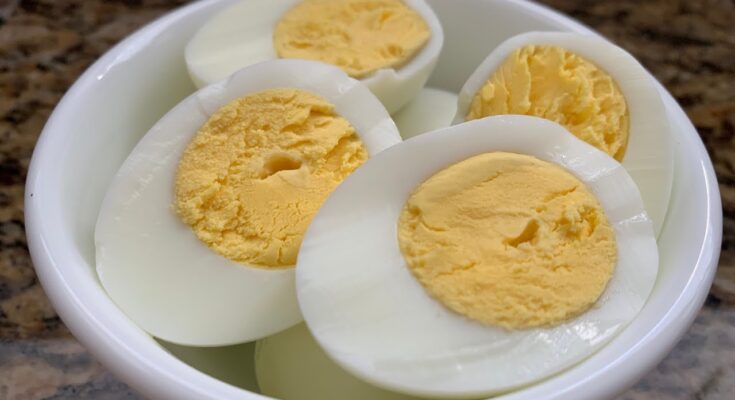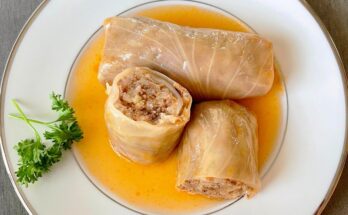Hard Boiled Egg Recipe: Hard-boiled eggs are a culinary classic, beloved for their simplicity, versatility, and health benefits. Whether you’re prepping a quick snack, crafting a salad, or packing lunch for work, hard-boiled eggs are the perfect solution.
In this guide, we’ll walk you through everything you need to know to make the perfect hard-boiled eggs every time.
Ingredients for Hard Boiled Eggs
One of the best things about hard-boiled eggs is their simplicity. Here’s all you’ll need:
- Eggs (fresh or slightly older eggs work best)
- Water (enough to cover the eggs)
- Ice (for cooling the eggs quickly)
- Optional: Vinegar or baking soda for easier peeling
That’s it! You’re working with nature’s perfect food, so no need for complicated ingredients.
Tools You’ll Need
Having the right tools ensures a smooth cooking process:
- Saucepan or Pot: Big enough to fit the eggs in a single layer.
- Timer: To track the cooking time accurately.
- Slotted Spoon: For safely removing the eggs from the hot water.
Preparing for Perfection
Choosing the Right Eggs
The freshness of your eggs matters! While fresh eggs are wonderful for poaching, older eggs (around 7–10 days old) are better for boiling as they peel more easily due to the separation of the egg white from the shell.
Preparing the Eggs for Boiling
Before you start, check for cracks. If any egg has visible cracks, set it aside for another use. Rinse the eggs under cool water to remove any debris or residue.
Step-by-Step Guide to Making Hard-Boiled Eggs
Step 1: Add Water to the Pot
Fill a saucepan with enough water to cover the eggs by about an inch. The water level ensures even cooking and prevents any eggs from being exposed during the boil.
Step 2: Gently Place the Eggs in the Water
Using a spoon, gently lower the eggs into the water to avoid cracking their shells. Arrange them in a single layer to ensure even cooking.
Step 3: Boil the Water
Set the pot on the stove over medium-high heat. Allow the water to come to a rolling boil.
Step 4: Timing the Cooking Process
Once the water is boiling, reduce the heat slightly to maintain a steady boil and set your timer:
- For soft-boiled eggs: 6–7 minutes.
- For medium-boiled eggs: 9–10 minutes.
- For hard-boiled eggs: 11–12 minutes.
Step 5: Remove and Cool the Eggs
When the timer goes off, immediately transfer the eggs to a bowl of ice water using a slotted spoon. The cold bath stops the cooking process and makes the eggs easier to peel later. Let them sit in the ice water for at least 10 minutes.
Tips for the Perfect Hard-Boiled Egg
Preventing Cracks While Cooking
To minimize cracks, always start with cold water and avoid rapid boiling. You can also add a teaspoon of vinegar or salt to the water to help coagulate any egg white that might escape if a shell does crack.
Ensuring Easy Peeling
For easy peeling, use eggs that are slightly older and always cool them completely in an ice bath. Rolling the egg gently on a flat surface before peeling helps loosen the shell.
Achieving the Perfect Texture
Overcooking can lead to a rubbery texture and unsightly green rings around the yolk. Stick to the recommended cooking times for perfect results.
How to Serve and Store Hard-Boiled Eggs
Serving Suggestions
Hard-boiled eggs are incredibly versatile and can be served in countless ways:
- As a Snack: Sprinkle with a pinch of salt and pepper for a quick and healthy snack.
- In Salads: Chop and toss into green salads, potato salads, or pasta salads.
- For Breakfast: Pair with toast, avocado, or fruit for a wholesome start to your day.
- Deviled Eggs: Scoop out the yolks, mix them with mayo and spices, and pipe them back in for an elegant appetizer.
- As a Garnish: Add to soups, ramen, or rice dishes for an extra layer of flavor.
Storing Leftover Eggs
Proper storage is key to maintaining freshness and flavor:
- Store unpeeled hard-boiled eggs in the refrigerator for up to 7 days.
- If peeled, keep them in an airtight container and cover them with a damp paper towel to prevent drying out.
- Always label the container with the date to track freshness.
Common Mistakes to Avoid
Making perfect hard-boiled eggs is easy, but a few common pitfalls can lead to less-than-ideal results:
- Overcooking the Eggs: Overcooked eggs develop a greenish-gray ring around the yolk and a rubbery texture. Use a timer to ensure accurate cooking times.
- Starting with Boiling Water: Placing eggs into already boiling water can cause them to crack. Always start with cold water to allow the eggs to heat gradually.
- Not Cooling the Eggs Properly: Skipping the ice bath can make eggs harder to peel and lead to overcooking from residual heat. Always cool eggs thoroughly before peeling or storing.
FAQs about Hard Boiled Egg Recipe
1. How long does it take to hard boil an egg?
It typically takes about 9 to 12 minutes to hard boil an egg. Start with cold water, bring it to a boil, then let the eggs cook in boiling water for this duration to ensure they are fully set.
2. What is the best way to ensure easy peeling of hard-boiled eggs?
To ensure easy peeling, add a pinch of baking soda to the boiling water. The alkalinity helps loosen the shell. Also, cooling the eggs in ice water immediately after boiling makes the shell easier to remove.
3. How can I tell if my eggs are fully cooked?
A fully cooked hard-boiled egg will have a firm yolk and white. If unsure, cut the egg in half. The yolk should be pale yellow with no visible liquid, and the white should be completely solid.
4. Can I hard boil fresh eggs?
Yes, but fresh eggs may be harder to peel. For easier peeling, use eggs that are a few days old as the pH level of the egg white increases with age, which helps the shell separate more easily.
5. How should I store hard-boiled eggs?
Store hard-boiled eggs in their shells in the refrigerator for up to a week. If peeled, keep them in a bowl of cold water in the refrigerator, changing the water daily, or in an airtight container with a damp paper towel to keep them moist.
Conclusion
Mastering the art of hard-boiled eggs is easier than you think with the right steps and a little practice. They’re a staple food that fits perfectly into any meal and are packed with nutrition and flavor. Whether you’re making them for a quick snack, a meal prep session, or a fancy brunch, this guide has you covered for success every time.
Enjoy your perfectly hard-boiled eggs and don’t hesitate to get creative with how you serve them. Bon appétit!



